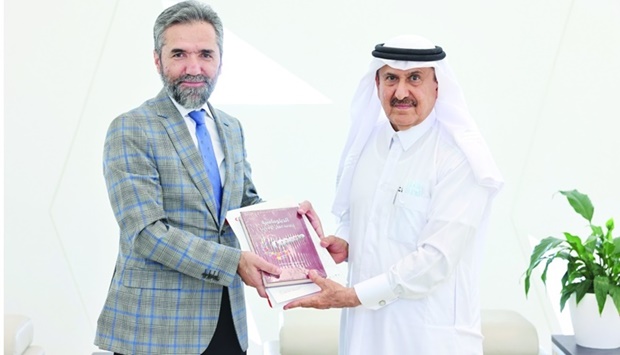They discussed ways to develop co-operation in terms of exchange of experience, lectures and publications on humanitarian diplomacy, international humanitarian law (IHL), and other academic and intellectual issues of common interest.
The meeting was attended by Dr Mostafa Osman al-Amin, professor of Islam and Global Affairs at HBKU-CIS, and Mehdi Benchaabane, director of the Education Development Institute (EDI), a member of Qatar Foundation (QF).

Al-Hammadi presented copies of his work, ‘Diplomacy and the Culture of Humanitarian Action’, to the HBKU-CIS Library, as a reference book for the students of the Master of Arts in Islam and Global Affairs (IGA).
Then, he delivered a lecture on Diplomacy and the Culture of Humanitarian Action, as part of the students’ academic programme for the year 2022-23. He shared with them his experience and knowledge acquired throughout four decades of diplomatic and humanitarian work. This experience was summarised in his biography, Diplomacy and the Culture of Humanitarian Action, a new publication of Katara Publishing House.
He delved deeply into the realm of diplomacy and humanitarianism, from the underlying premises to practical outcomes. Both in theory and in application, he discussed traditional diplomacy vs. humanitarian diplomacy, two concepts that have the common cultural ground of advocating human respect, dignity, freedom and the right to a decent and safe life, towards the ultimate goal of serving vulnerable people.
The lecture traced the field applications of humanitarian action in Islam back to the earliest form of a Muslim Red Crescent created by Rufaida al-Aslamiya, evolving later during the Rightly Guided Caliphate, Umayyad Era (Bilad Al-Sham), Umayyad Era (Al-Andalus), Abbasid Era, Ayyubid Era and the Ottoman Empire.
Discussing the challenges to humanitarian action in a diplomatic context, al-Hammadi said, “In the absence of freedoms and democratic systems, diplomacy gets off track as a vehicle for international relations, and a new path is imposed upon it other than its supposed transparent nature. This is where diplomatic work obstructs humanitarian activities, with politicians concerned primarily with advocating their supporters and disregarding others. As a result, humanitarian action is diverted, the organisations involved in humanitarian affairs are stuck in politics, services and aid are appropriated on the basis of loyalty, an abominable quota system emerges, and humanitarian hands become anti-humanitarian hands. It is a major challenge facing both humanitarian and diplomatic activities.”
According to him, humanitarian diplomacy is one tool that complements traditional diplomacy. In this context, humanitarian diplomacy will be seen as a tool of soft power. Humanitarian organisations are among the most influential actors internationally to solve problems and crises using the effective mechanisms of constructive dialogue and peaceful means. They also have multiple roles such as mediation, release of prisoners, etc. The aim is to establish humanitarian diplomacy as an integral part of an entire humanitarian system.
After that, al-Hammadi presented Qatar’s international diplomatic and humanitarian models, its role in helping poor countries respond to Covid-19, and its multifaceted contributions to end poverty in all its forms as one of the United Nations Sustainable Development Goals.
The lecture shed light on the strategic partnership between QRCS and Qatar Fund for Development, working together on numerous relief interventions and development projects around the world. They also have strategic understandings to develop humanitarian action in Qatar.
The last point in the lecture was the International Red Cross and Red Crescent Movement, which comprises the International Committee of the Red Cross and the International Federation of Red Cross and Red Crescent Societies.

